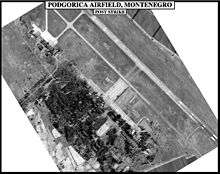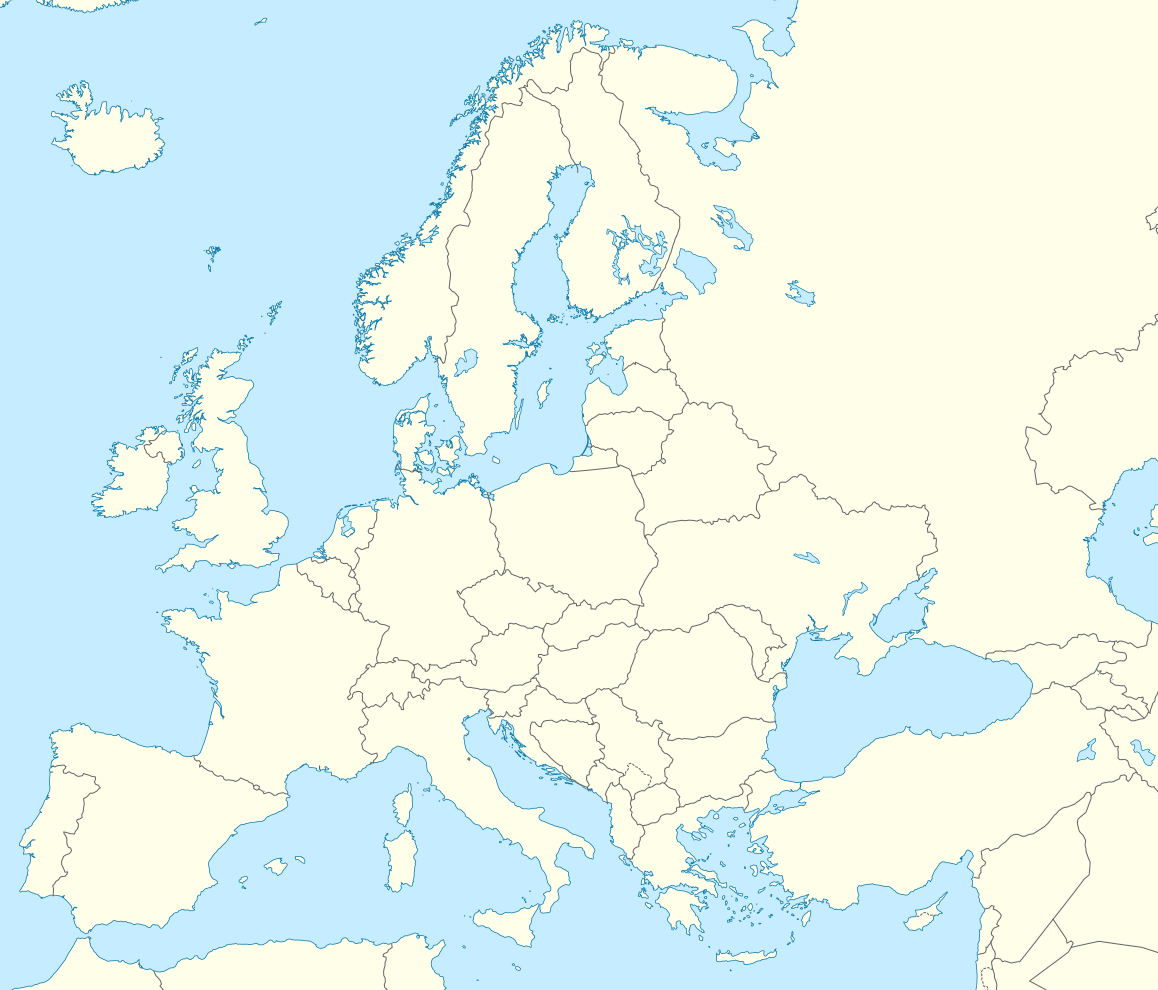Podgorica Airport
| Podgorica Airport Аеродром Подгорица | |||||||||||
|---|---|---|---|---|---|---|---|---|---|---|---|
 | |||||||||||
| IATA: TGD – ICAO: LYPG | |||||||||||
| Summary | |||||||||||
| Airport type | Public | ||||||||||
| Operator | Airports of Montenegro | ||||||||||
| Serves | Podgorica, Montenegro | ||||||||||
| Location | Golubovci | ||||||||||
| Hub for | Montenegro Airlines | ||||||||||
| Elevation AMSL | 141 ft / 43[1] m | ||||||||||
| Coordinates | 42°21′34″N 19°15′07″E / 42.35944°N 19.25194°ECoordinates: 42°21′34″N 19°15′07″E / 42.35944°N 19.25194°E | ||||||||||
| Website | montenegroairports.com | ||||||||||
| Map | |||||||||||
 TGD Location of the airport in Montenegro | |||||||||||
| Runways | |||||||||||
| |||||||||||
| Statistics (2015) | |||||||||||
| |||||||||||
Podgorica Airport (Montenegrin: Аеродром Подгорица / Aerodrom Podgorica, pronounced [aerǒdrom pǒdɡorit͡sa]) (IATA: TGD, ICAO: LYPG) is an international airport serving the Montenegrin capital of Podgorica and the surrounding region. It is one of two international airports in Montenegro, the other being Tivat Airport. Both are operated by the state-owned company Airports of Montenegro (Аеродроми Црне Горе, Aerodromi Crne Gore).
The airport is situated 11 km (6.8 mi) south of central Podgorica, in the Zeta Plain, one of the few flat areas of Montenegro suitable for a large airport. The airport is locally known as Golubovci Airport, as it is located within the administrative boundaries of the town of Golubovci. The IATA code of the airport is still TGD because Podgorica was named Titograd (after Josip Broz Tito) from 1946 to 1992, during which time the airport opened. It is the main hub for Montenegro Airlines and Di Air.
History
The history of civil aviation in Podgorica began on May 26, 1928, when a Aeroput Potez 29/2 landed on the Podgorica airfield, a small airfield with grass runway, located near the site of today's Podgorica Rail Station. The plane was on experimental line Belgrade-Skopje-Podgorica-Mostar-Sarajevo-Belgrade line, organized to examine the possibilities of linking Belgrade with southern parts of Yugoslavia. On May 5, 1930, scheduled passenger flights began on Belgrade-Sarajevo-Podgorica line.[2] Aeroput used Farman F.300 aircraft on this line.
World War II brought an end to passenger traffic at the airfield. In 1943 and 1944, airfield was used by Luftwaffe in then German-occupied Montenegro. It was frequent target in the infamous bombing of Podgorica, resulting in significant German losses.
After the war, passenger service resumed on April 8, 1947, with newly formed JAT flight to Belgrade on a Douglas C-47 converted for passenger use. A cargo line to Belgrade was established in 1957.
The airport was moved to its present location to the south of the city in 1961. It featured a 2500 m × 45 m asphalt runway; it was modernized and refurbished in 1977. The majority of traffic in this period consisted of scheduled flights to Belgrade, mostly with McDonnell Douglas DC-9 aircraft.[3]
The airport was frequent target during 1999 NATO bombing, when numerous Podgorica Airbase facilities and underground fuel tanks were destroyed. However, no significant damage on the passenger terminal or runway and taxiway systems was inflicted.
On April 23, 2003 the ownership of the airport was transferred from Jat Airways to Airports of Montenegro, a public company owned by the Government of Montenegro. Along with formation and growth of Montenegro Airlines, this contributed to diversification of services from the airport. Decades long practice of Podgorica Airport being the feeder airport for Belgrade Airport was dropped in favor of a more diverse network of scheduled passenger flights.
A major renovation and expansion took place in 2006, with a refurbishment and extension of the apron and improvements to the taxiways system, airfield lighting system, and power supply. An entirely new passenger terminal was opened on May 14, 2006, while the old passenger terminal underwent reconstruction and refurbishment in 2009. Airports Council International awarded Podgorica the best airport under 1 million passengers in 2007.
The improved taxiway system allowed for wide-body aircraft to be serviced at the airport. Thus, the airport began servicing Il-86s and first the Boeing 747 freighter arrived at the airport in April 2008.
Facilities
Terminals
As air traffic in Montenegro saw a rapid increase in the 2000s, the old passenger terminal, a small cobblestone building, was retired except for servicing small-volume charter flights after the new terminal was built. The new passenger terminal, comprising 5,500 m2, opened on May 14, 2006. It has eight departure and two arrival gates, and is able to handle up to 1 million passengers annually. The terminal does not feature jetways, as passenger flow at the airport is not high enough to necessitate them.
The main (new) terminal building is a modern aluminium and glass structure, featuring contemporary architectural solutions such as indirect lighting throughout the building. Since its opening, it has featured a Costa Coffee outlet, two newspaper stalls, a duty-free shop, rent-a-car posts, and a CKB bank outlet. Although the airport is considered low-risk, security screening has been visibly increased since the introduction of the new terminal. Security measures and monitoring that are standard for European airports are applied in the terminal.
The old terminal building was completely renovated and reopened on September 15, 2009 and is now intended for VIP use and general aviation.
Runway
Standard runway 36 approach includes spectacular 200° low level steep turn over Lake Skadar to align with the runway, only 524 metres (1,719 ft) above the water surface. The airport has ICAO classification 4E ILS Cat I. However, ILS landing is possible only on runway 36, as northern approach to runway 18 is visual only, possible under perfect VMC. This is due to proximity of Dinaric Alps in the north.
Military usage

Podgorica Airport is a public international airport, but shares the main runway with Podgorica's military airbase. Military facilities include an 80-hectare (200-acre) airbase area adjacent to the main runway, as well as the Šipčanik complex.
The Šipčanik complex consisted of an underground aircraft shelter tunneled into the eponymous hill, and adjacent narrow 08/26 runway, which could be used to scramble the jets stored in the shelter. This runway is connected to the main airport complex via a 3-kilometre-long (9,800 ft) taxiway cut through the vineyards. The complex was seriously damaged during the 1999 NATO bombing of Yugoslavia, and was subsequently converted into a wine cave by the Plantaže company.
In early December 1999 the airport was briefly seized by the Army of Yugoslavia in a standoff between the central government and the Montenegrin authorities after Montenegro tried to control the airport independently from Belgrade.[4] When Montenegro became independent on June 3, 2006, the newly formed Military of Montenegro announced that it would not maintain a combat air force. Nine G-4 Super Galebs are currently sitting unused at the base.
Airlines and destinations
The following airlines serve scheduled and charter services to and from Podgorica Airport:[5]
| Airlines | Destinations |
|---|---|
| Adria Airways | Ljubljana |
| Air Serbia | Belgrade |
| Alitalia operated by Alitalia CityLiner | Rome-Fiumicino |
| Austrian Airlines | Vienna |
| Montenegro Airlines | Belgrade, Frankfurt, Ljubljana, Paris-Charles de Gaulle, Rome-Fiumicino, Vienna, Zürich Seasonal: Copenhagen, Düsseldorf, Lyon, Moscow-Domodedovo |
| Ryanair | Berlin-Schönefeld, Brussels-Charleroi, London-Stansted |
| SmartWings operated by Travel Service | Seasonal: Prague |
| Turkish Airlines | Istanbul-Atatürk |
| Wizz Air | Memmingen, Milan–Malpensa |
Destinations map
The map includes European destinations served from Podgorica Airport.

Statistics
Passengers
 |
| Year | Passengers | Change | Aircraft movements | Change |
|---|---|---|---|---|
| 2007 | 460,117 | 4,919 | ||
| 2008 | 538,477 | 5,693 | ||
| 2009 | 450,300 | 5,455 | ||
| 2010 | 651,642 | 6,896 | ||
| 2011 | 611,666 | 6,136 | ||
| 2012 | 620,117 | 5,560 | ||
| 2013 | 680,854 | 5,528 | ||
| 2014 | 701,320 | 5,247 | ||
| 2015 | 748,175 | 5,545 | ||
Routes
| City | Airport | Weekly Departures (Summer 2016) |
Airlines |
|---|---|---|---|
| |
Belgrade Nikola Tesla Airport | 35 | Montenegro Airlines, Air Serbia |
| |
Schwechat Airport | 12 | Montenegro Airlines, Austrian Airlines |
| |
Atatürk Airport | 12 | Turkish Airlines |
| |
Leonardo da Vinci-Fiumicino Airport | 8 | Montenegro Airlines, Alitalia |
| |
Paris Charles de Gaulle Airport | 7 | Montenegro Airlines |
| |
Ljubljana Jože Pučnik Airport | 6 | Montenegro Airlines, Adria Airways |
| |
Zürich Airport | 6 | Montenegro Airlines |
Ground transportation
Podgorica Airport is accessible by Podgorica - Bar road (E65/E80), via short detour. A stretch of this road, from Podgorica to the airport, has been upgraded to expressway standard. A drive from the city center to the airport usually takes less than 15 minutes. Public transportation to and from airport is covered by L-20 bus line to city center, charter bus lines to other Montenegrin cities, and taxi service. The Airport train station on the Belgrade–Bar railway is located 1.2 kilometres (0.75 mi) away from the passenger terminal, but is seldom used as a link to the city, due to the inconvenient location and train schedule.
With the construction of Sozina tunnel, the airport is some 40 km away from Bar, Montenegro's main port, and so the airport increasingly caters to needs of cities on southern part of Montenegrin coast.
Accidents and incidents
- On 11 September 1973, Podgorica Airport was the destination of JAT Airways Flight 769, a Sud Aviation SE-210 Caravelle 6-N, which flew into the Babin Zub peak on Maganik mountain north of Podgorica. All 41 on board perished.
- On 25 January 2005, Montenegro Airlines Fokker 100 (YU-AOM) nosegear collapsed after runway excursion during a night landing in snowy conditions. The nosegear collapsed and the airplane skidded for about 700 meters before coming to rest, 1180 meters after touchdown. Two passengers, the pilot and copilot received minor injuries. The airline was sued by passengers, as it was the only airline to operate flights to Podgorica that evening (other airlines canceled flights due to insufficient ice clearance technology at the airport).
- On 7 January 2008, at about 9:30pm, a Montenegro Airlines Fokker 100 (4O-AOK) was shot at while landing at Podgorica Airport. A routine inspection of the aircraft led to the discovery of a bullet hole in the aircraft's tail. The aircraft was carrying 20 passengers, but none was injured. The reason for the incident is unknown, however, reports indicate that it may have been an inadvertent result of guns being fired during celebrations for Orthodox Christmas.
- On 14 June 2013, at 6:00pm, Montenegro Airlines Fokker 100 took off on a scheduled flight from Podgorica to Belgrade when the pilots discovered problem with the landing gear which didn't retract after taking off. Plane circled around due to full fuel tank that needed to be emptied in order to land. No injuries or fatalities were recorded as plane safely landed at Podgorica Airport.
See also
References
- ↑ http://www.montenegroairports.com/eng/index.php?menu=1&menu1=5&news=33
- ↑ Drustvo za Vazdusni Saobracaj A D – Aeroput (1927-1948) at europeanairlnes.no
- ↑ "Airport of Montenegro". Retrieved 2 October 2014.
- ↑ New York Times: Armed Yugoslav Troops Take Over Montenegro's Main Airport. December 9, 1999
- ↑ A.D. Aerodromi Crne Gore: Nedeljni i sezonski red letenja
External links
![]() Media related to Podgorica Airport at Wikimedia Commons
Media related to Podgorica Airport at Wikimedia Commons
- Official website
- Airport information for LYPG at World Aero Data. Data current as of October 2006.Source: DAFIF.
- Airport information for LYPG at Great Circle Mapper. Source: DAFIF (effective October 2006).
- Current weather for LYPG at NOAA/NWS
- Accident history for TGD at Aviation Safety Network
- Ground Transportation at AirportJump.com
